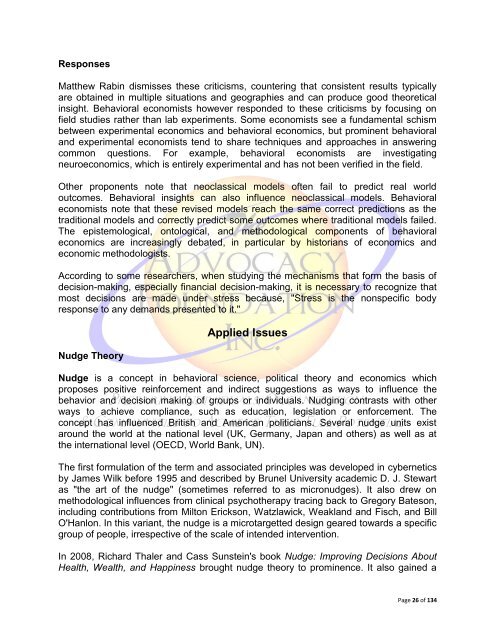Cultural Transformation
Cultural Transformation
Cultural Transformation
You also want an ePaper? Increase the reach of your titles
YUMPU automatically turns print PDFs into web optimized ePapers that Google loves.
Responses<br />
Matthew Rabin dismisses these criticisms, countering that consistent results typically<br />
are obtained in multiple situations and geographies and can produce good theoretical<br />
insight. Behavioral economists however responded to these criticisms by focusing on<br />
field studies rather than lab experiments. Some economists see a fundamental schism<br />
between experimental economics and behavioral economics, but prominent behavioral<br />
and experimental economists tend to share techniques and approaches in answering<br />
common questions. For example, behavioral economists are investigating<br />
neuroeconomics, which is entirely experimental and has not been verified in the field.<br />
Other proponents note that neoclassical models often fail to predict real world<br />
outcomes. Behavioral insights can also influence neoclassical models. Behavioral<br />
economists note that these revised models reach the same correct predictions as the<br />
traditional models and correctly predict some outcomes where traditional models failed.<br />
The epistemological, ontological, and methodological components of behavioral<br />
economics are increasingly debated, in particular by historians of economics and<br />
economic methodologists.<br />
According to some researchers, when studying the mechanisms that form the basis of<br />
decision-making, especially financial decision-making, it is necessary to recognize that<br />
most decisions are made under stress because, "Stress is the nonspecific body<br />
response to any demands presented to it."<br />
Nudge Theory<br />
Applied Issues<br />
Nudge is a concept in behavioral science, political theory and economics which<br />
proposes positive reinforcement and indirect suggestions as ways to influence the<br />
behavior and decision making of groups or individuals. Nudging contrasts with other<br />
ways to achieve compliance, such as education, legislation or enforcement. The<br />
concept has influenced British and American politicians. Several nudge units exist<br />
around the world at the national level (UK, Germany, Japan and others) as well as at<br />
the international level (OECD, World Bank, UN).<br />
The first formulation of the term and associated principles was developed in cybernetics<br />
by James Wilk before 1995 and described by Brunel University academic D. J. Stewart<br />
as "the art of the nudge" (sometimes referred to as micronudges). It also drew on<br />
methodological influences from clinical psychotherapy tracing back to Gregory Bateson,<br />
including contributions from Milton Erickson, Watzlawick, Weakland and Fisch, and Bill<br />
O'Hanlon. In this variant, the nudge is a microtargetted design geared towards a specific<br />
group of people, irrespective of the scale of intended intervention.<br />
In 2008, Richard Thaler and Cass Sunstein's book Nudge: Improving Decisions About<br />
Health, Wealth, and Happiness brought nudge theory to prominence. It also gained a<br />
Page 26 of 134

















